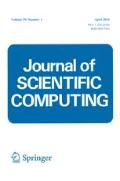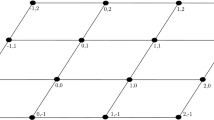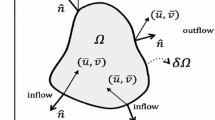Abstract
A new family of high order methods for systems of conservation laws is introduced: the Compact Approximate Taylor (CAT) methods. As in the approximate Taylor methods proposed by Zorío et al. (J Sci Comput 71(1):246–273, 2017) the Cauchy–Kovalevskaya procedure is circumvented by using Taylor approximations in time that are computed in a recursive way. The difference is that here this strategy is applied locally to compute the numerical fluxes what leads to methods that have \((2 p +1)\)-point stencil and order of accuracy 2p, where p is an arbitrary integer. Moreover we prove that they reduce to the high-order Lax–Wendroff methods for linear problems and hence they are linearly \(L^2\)-stable under a \(CFL-1\) condition. In order to prevent the spurious oscillations that appear close to discontinuities two shock-capturing techniques have been considered: a flux-limiter technique and WENO reconstruction for the first time derivative (WENO-CAT methods). We follow [25] in the second approach. A number of test cases are considered to compare these methods with other WENO-based schemes: the linear transport equation, Burgers equation, the 1D compressible Euler equations, and the ideal Magnetohydrodynamics equations are considered. Although CAT methods present an extra computational cost due to the local character, this extra cost is compensated by the fact that they still give good solutions with CFL values close to 1.
















Similar content being viewed by others
References
Baeza, A., Bürger, R., Mulet, P., Zorío, D.: On the efficient computation of smoothness indicators for a class of WENO reconstructions. \(\text{CI}^2\text{ MA }\) Pre-PublicacIón 2018-37 (2018)
Brio, M., Wu, C.C.: An upwind differencing scheme for the equations of ideal magnetohydrodynamics. J. Comput. Phys 75(2), 400–422 (1988)
Diot, S., Clain, S., Loubère, R.: A high-order finite volume method for hyperbolic systems: multi-dimensional optimal order detection (MOOD). J. Comput. Phys. 230, 4028–4050 (2011)
Dumbser, M., Balsara, D., Toro, E.F., Munz, C.D.: A unified framework for the construction of one-step finite-volume and discontinuous Galerkin schemes. J. Comput. Phys. 227, 8209–8253 (2008)
Dumbser, M., Enaux, C., Toro, E.F.: Finite volume schemes of very high order of accuracy for stiff hyperbolic balance laws. J. Comput. Phys 227, 3971–4001 (2008)
Fornberg, B.: Generation of finite difference formulas on arbitrarily spaced grids. Math. Comput. 51(184), 699–706 (1988)
Fornberg, B.: Classroom note: calculation of weights in finite difference formulas. SIAM Rev. 40(3), 685–691 (1998)
Gottlieb, S., Ketcheson, D., Shur, C.W.: Strong stability preserving Runge–Kutta and multistep time discretizations. Word Scientific, Singapore (2011)
Harten, A., Engquist, B., Osher, S., Chakravathy, S.: Uniformly high order accurate essentially non-oscillatory schemes, III. J. Comput. Phys. 71, 231–303 (1987)
Kemm, F.: A comparative study of TVD-limiters—well-known limiters and an introduction of new ones. Int. J. Numer. Methods Fluids 67(4), 404–440 (2010)
Lax, P., Wendroff, B.: Systems of conservation laws. Commun. Pure Appl. Math. 13(2), 217–237 (1960)
LeVeque, R.J.: Finite difference methods for ordinary and partial differential equations: steady-state and time-dependent problems (Classics in Applied Mathematics). Society for Industrial and Applied Mathematics, Philadelphia, PA (2007)
LeVeque, R.J.: Finite volume methods for hyperbolic problems. Cambridge Texts in Applied Mathematics. Cambridge University Press, Cambridge (2002)
Li, J., Yang, Z.: The von Neumann analysis and modified equation approach for finite difference schemes. Appl. Math. Comput. 225, 610–621 (2013)
Lukácová-Medvid’ová, M., Warnecke, G.: Lax–Wendroff type second order evolution Galerkin methods for multidimensional hyperbolic systems. East-West J. Numer. Math. 8, 127–152 (2000)
Qiu, J., Shu, C.-W.: Finite difference WENO schemes with Lax–Wendroff-type time discretizations. SIAM J. Sci. Comput. 24(6), 2185–2198 (2003)
Schwartzkopff, T., Munz, C.D., Toro, E.F.: ADER: a high-order approach for linear hyperbolic systems in 2D. J. Sci. Comput. 17, 231–240 (2002)
Shu, C.-W., Osher, S.: Efficient implementation of essentially non-oscillatory shock-capturing schemes, II. J. Comput. Phys. 83(1), 32–78 (1989)
Sod, G.A.: A survey of several finite difference methods for systems of nonlinear hyperbolic conservation laws. J. Comput. Phys. 27(1), 1–31 (1978)
Titarev, V.A., Toro, E.F.: ADER: arbitrary high order Godunov approach. J. Sci. Comput. 17, 609–618 (2002)
Toro, E.F., Millington, R.C., Nejad, L.A.M: Towards very high order Godunov schemes. In: E.F. Toro (ed) Godunov Methods: Theory and Applications. Kluwer/Plenum Academic Publishers, pp. 905–938 (2001)
Toro, E.F.: Primitive, conservative and adaptive schemes for hyperbolic conservation laws. In: Toro, E.F., Clarke, J.F. (eds.) Numerical Methods for Wave Propagation, pp. 323–385. Kluwer, Dordrecht (1998)
Toro, E.F.: Riemann Solvers and Numerical Methods for Fluid Dynamics: A Practical Introduction. Springer, Berlin (2009)
Warming, R.F., Hyett, B.J.: The modified equation approach to the stability and accuracy analysis of finite-difference methods. J. Comput. Phys. 14(2), 159–179 (1974)
Zorío, D., Baeza, A., Mulet, P.: An approximate Lax–Wendroff-type procedure for high order accurate schemes for hyperbolic conservation laws. J. Sci. Comput. 71(1), 246–273 (2017)
Zwas, G., Abarbanel, S.: Third and fourth order accurate schemes for hyperbolic equations of conservation law form. Math. Comput. 25(114), 229–236 (1971)
Acknowledgements
The authors would like to thank M.J. Castro, G. Russo, and D. Zorío for stimulating discussions and the referees for their valuable comments. This project has received funding from the European Union’s Horizon 2020 research and innovation program, under the Marie Sklodowska-Curie Grant Agreement No. 642768.
Author information
Authors and Affiliations
Corresponding author
Additional information
Publisher's Note
Springer Nature remains neutral with regard to jurisdictional claims in published maps and institutional affiliations.
Rights and permissions
About this article
Cite this article
Carrillo, H., Parés, C. Compact Approximate Taylor Methods for Systems of Conservation Laws. J Sci Comput 80, 1832–1866 (2019). https://doi.org/10.1007/s10915-019-01005-1
Received:
Revised:
Accepted:
Published:
Issue Date:
DOI: https://doi.org/10.1007/s10915-019-01005-1




